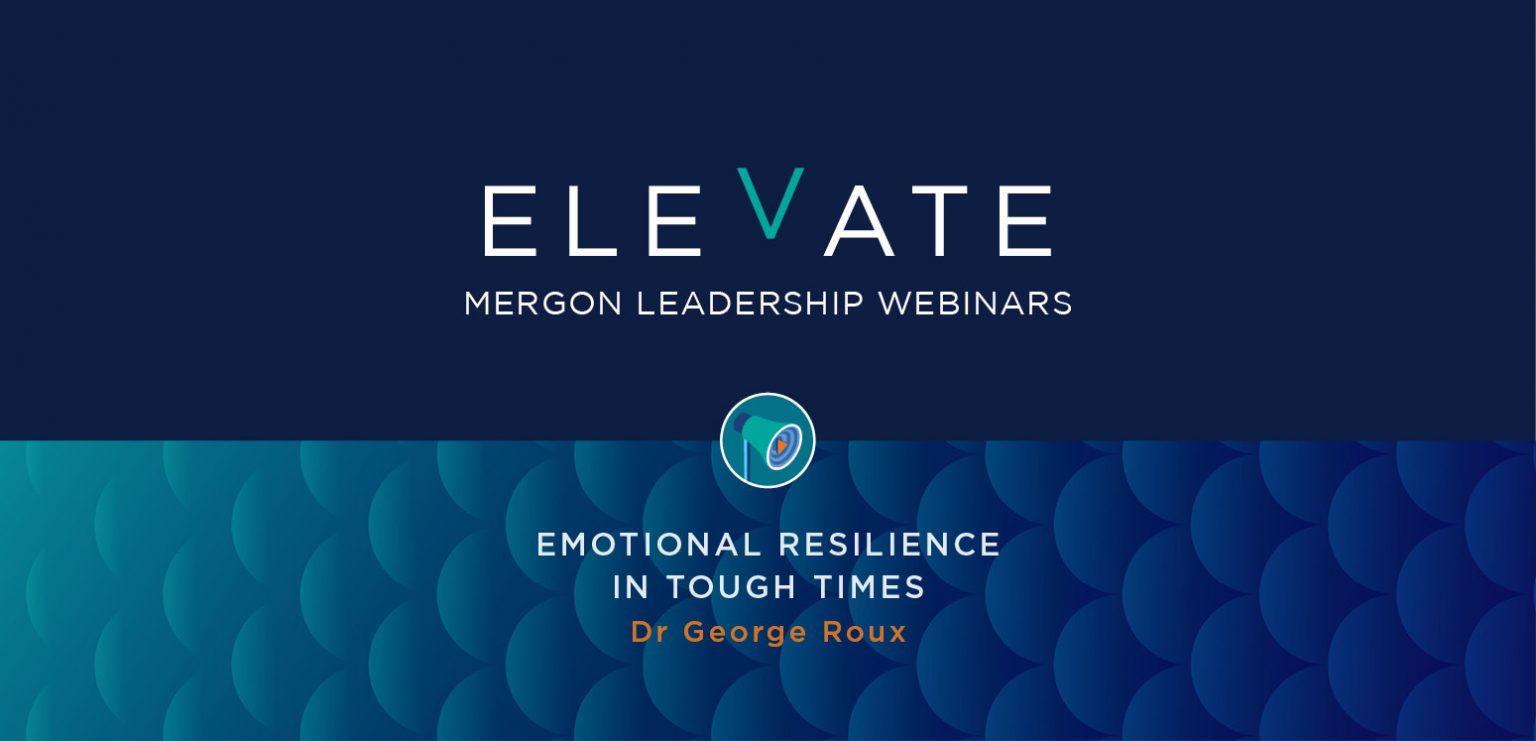Watch the full webinar here.
The cumulative strains and stresses of the past few months have resulted in a large number of emotionally fatigued leaders, which is not something we can afford to ignore.
In the first Mergon Elevate Leadership webinar, we heard from Dr George Roux, a seasoned psychologist, on how leaders can practically take care of themselves and build emotional resilience. Dr Roux has worked extensively with ministry leaders and has an intuitive understanding of leaders’ needs and how to serve them towards emotional health.
‘The impact the virus has had on the world has been catastrophic, on the economic front but also on a personal level,’ says Dr Roux. ‘It’s influencing our overall well being – physically and psychologically.’
‘Statistics show that 35% of the South African population is suffering from a psychological stress-related illness, whether it’s anxiety, depression, post-traumatic stress disorder, or burnout,’ he explains.
Time to reflect
Dr Roux says it’s crucial for leaders to become aware of how they are coping. Leaders need to become aware of how this time has impacted them by asking themselves what has happened (or is happening) to them emotionally, physically, spiritually, and in their relationships. As leaders have been taking care of others, they now need to prioritise taking care of themselves.
‘If we think of a car’s instrument panel on the dashboard: there are two red lights that we need to be very aware of. The one is measuring the temperature of the car and the other one is measuring the oil temperature of the engine. If either of these flicker, we are trained to stop the car immediately because if we don’t, we’ll cease the engine. The same should apply to leaders – when the red lights are flickering, whether it’s stress, anxiety, depression or burnout, you need to stop and measure yourself,’ he explains.
Dr Roux has compiled four short questionnaires to help measure stress, anxiety, depression and burnout – the four biggest issues people are struggling with at the moment.
- Physical and psychological indicators of stress questionnaire
- Burns Anxiety Inventory
- Burns Depression Checklist
- Burnout checklist
Building resilience
Resilience can be described as the capacity to recover quickly from difficulties or to bounce back from setbacks and trauma. Resilient leaders also carry the responsibility for helping to protect the people in their teams. But how do we become resilient leaders?
1. A resilient leader is an honest leader. This is not the time to pretend that we ‘have it all together’. This is a wonderful opportunity to admit to ourselves, as well as to our teams and those we serve, that we are all vulnerable. There is something freeing in being vulnerable and acknowledging that we don’t have all the answers and that we’re all battling with the uncertainties.
2. The situation we’re in is also an invitation to start thinking outside of the box again. This is, in a sense, a ‘half-time’ experience for us where instead of focussing on success, we need to rather focus on significance. Have honest conversations with your teams and invite them to participate and give their input. Use this time to brainstorm new ideas, new vision, new goals as well as new strategies.
3. Remember that we are human beings, not human doings. Being with God is far more important than doing for God. It’s not about all that we do, but also about who we are. To become resilient leaders, we have to freshly clothe ourselves in our true identity – our identity in Christ. We have to remind ourselves that the most important thing in life is not our ministry, nor is it the people we serve – it’s our families and those closest to us. We shouldn’t be in ministry if it is to the detriment of our own health or our at the expense of our most important relationships.
4. This time should also be an invitation into grace and faith. God will not let us down. Remind yourself and your team that it’s not your ministry, it’s God’s ministry. He has provided in the past and He will continue to provide. We can relinquish all our concerns to him.
How do I assist my team during this period?
1. Your openness and vulnerability as a leader should be an invitation to your team to share. Ask them how they are coping and what their fears and concerns are. Also, remember to ask them to complete the four questionnaires:
- Physical and psychological indicators of stress questionnaire
- Burns Anxiety Inventory
- Burns Depression Checklist
- Burnout checklist
2. Involve each person on your team to join in brainstorming sessions to find new solutions.
3. Protect the members of your team. Make sure your team members have personal protective equipment in place.
4. Be patient with yourself, your family, and your colleagues.
5. Meet regularly with your team to support and encourage one another, and to pray and laugh together. Focus first on your team before your ministry.
6. Don’t focus on the things that are out of your control. Instead, focus on the positives, the things that are within your control.
Mergon’s Elevate Leadership Webinars has been curated specifically for the tough season we’re in. The next Elevate webinar will take place on 21 July 2020, presented by Paul Donders on the topic of ‘Phases of leadership in crisis’.
All rights reserved. Copyright 2018 Mergon Group.
